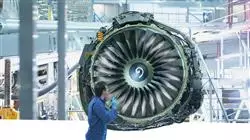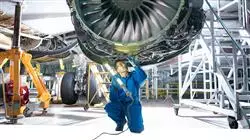University certificate
Accreditation/Membership
The world's largest faculty of engineering”
Introduction to the Program
Enroll now in a university program that responds to your professional motivations and growth in the aviation sector"

From the reduction of greenhouse gas emissions, the improvement of safety measures, to the technological development of unmanned aircraft and their integration into the airspace make up the great challenges of the aeronautical sector.
For this reason, the professional engineers who wishes to prosper in this industry must have a global knowledge of its operation, as well as specialized knowledge of the elements of manufacturing, design and commissioning of both aircraft and airports. A complete knowledge that will be much easier to acquire thanks to this Master's Degree in Aeronautical Engineering created by this institution.
An intensive program that consists of a syllabus that has been prepared by an excellent team of professionals dedicated to this industry. Their technical and teaching experience is reflected in a syllabus that covers technological innovations and aeronautical operations, deepens in the main actors of the sector, continued airworthiness, comprehensive sustainability and the entire international regulatory framework.
Students will obtain this learning through advanced content, complemented by video summaries of each topic, detailed videos, specialized readings and simulations of case studies that can be accessed comfortably, whenever and wherever they wish.
To take this program, the graduates only needs a digital device with an Internet connection to visualize, at any time of the day, the syllabus hosted on the virtual platform. A unparalleled academic option that only TECH, the world's largest digital university, can offer.
A 12-month Master's Degree in Aeronautical Engineering that adapts to your schedule"
This Master's Degree in Aeronautical Engineering contains the most complete and up-to-date program on the market. The most important features include:
- Development of case studies presented by experts in Aeronautical engineering
- Graphic, schematic, and practical contents with which they are created, provide scientific and practical information on the disciplines that are essential for professional practice
- Practical exercises where self-assessment can be used to improve learning
- Its special emphasis on innovative methodologies
- Theoretical lessons, questions to the expert, debate forums on controversial topics, and individual reflection assignments
- Content that is accessible from any fixed or portable device with an Internet connection
Thanks to the Relearning system, you will acquire an effective learning experience far from the long hours of study. Enroll now”
The program’s teaching staff includes professionals from sector who contribute their work experience to this educational program, as well as renowned specialists from leading societies and prestigious universities.
Its multimedia content, developed with the latest educational technology, will provide the professionals with situated and contextual learning, i.e., a simulated environment that will provide an immersive education programmed to learn in real situations.
The design of this program focuses on Problem-Based Learning, by means of which the professionals must try to solve the different professional practice situations that are presented throughout the academic course. This will be done with the help of an innovative system of interactive videos made by renowned experts.
The case studies will allow you to obtain a real analysis of the regulations in which the main actors of air transport operate"

With this university program you will be up to date in the measures applied for the efficiency and reduction of acoustic and gaseous emissions in aviation"
Why study at TECH?
TECH is the world’s largest online university. With an impressive catalog of more than 14,000 university programs available in 11 languages, it is positioned as a leader in employability, with a 99% job placement rate. In addition, it relies on an enormous faculty of more than 6,000 professors of the highest international renown.

Study at the world's largest online university and guarantee your professional success. The future starts at TECH”
The world’s best online university according to FORBES
The prestigious Forbes magazine, specialized in business and finance, has highlighted TECH as “the world's best online university” This is what they have recently stated in an article in their digital edition in which they echo the success story of this institution, “thanks to the academic offer it provides, the selection of its teaching staff, and an innovative learning method aimed at educating the professionals of the future”
A revolutionary study method, a cutting-edge faculty and a practical focus: the key to TECH's success.
The most complete study plans on the university scene
TECH offers the most complete study plans on the university scene, with syllabuses that cover fundamental concepts and, at the same time, the main scientific advances in their specific scientific areas. In addition, these programs are continuously being updated to guarantee students the academic vanguard and the most in-demand professional skills. In this way, the university's qualifications provide its graduates with a significant advantage to propel their careers to success.
TECH offers the most comprehensive and intensive study plans on the current university scene.
A world-class teaching staff
TECH's teaching staff is made up of more than 6,000 professors with the highest international recognition. Professors, researchers and top executives of multinational companies, including Isaiah Covington, performance coach of the Boston Celtics; Magda Romanska, principal investigator at Harvard MetaLAB; Ignacio Wistumba, chairman of the department of translational molecular pathology at MD Anderson Cancer Center; and D.W. Pine, creative director of TIME magazine, among others.
Internationally renowned experts, specialized in different branches of Health, Technology, Communication and Business, form part of the TECH faculty.
A unique learning method
TECH is the first university to use Relearning in all its programs. It is the best online learning methodology, accredited with international teaching quality certifications, provided by prestigious educational agencies. In addition, this disruptive educational model is complemented with the “Case Method”, thereby setting up a unique online teaching strategy. Innovative teaching resources are also implemented, including detailed videos, infographics and interactive summaries.
TECH combines Relearning and the Case Method in all its university programs to guarantee excellent theoretical and practical learning, studying whenever and wherever you want.
The world's largest online university
TECH is the world’s largest online university. We are the largest educational institution, with the best and widest online educational catalog, one hundred percent online and covering the vast majority of areas of knowledge. We offer a large selection of our own degrees and accredited online undergraduate and postgraduate degrees. In total, more than 14,000 university degrees, in eleven different languages, make us the largest educational largest in the world.
TECH has the world's most extensive catalog of academic and official programs, available in more than 11 languages.
Google Premier Partner
The American technology giant has awarded TECH the Google Google Premier Partner badge. This award, which is only available to 3% of the world's companies, highlights the efficient, flexible and tailored experience that this university provides to students. The recognition as a Google Premier Partner not only accredits the maximum rigor, performance and investment in TECH's digital infrastructures, but also places this university as one of the world's leading technology companies.
Google has positioned TECH in the top 3% of the world's most important technology companies by awarding it its Google Premier Partner badge.
The official online university of the NBA
TECH is the official online university of the NBA. Thanks to our agreement with the biggest league in basketball, we offer our students exclusive university programs, as well as a wide variety of educational resources focused on the business of the league and other areas of the sports industry. Each program is made up of a uniquely designed syllabus and features exceptional guest hosts: professionals with a distinguished sports background who will offer their expertise on the most relevant topics.
TECH has been selected by the NBA, the world's top basketball league, as its official online university.
The top-rated university by its students
Students have positioned TECH as the world's top-rated university on the main review websites, with a highest rating of 4.9 out of 5, obtained from more than 1,000 reviews. These results consolidate TECH as the benchmark university institution at an international level, reflecting the excellence and positive impact of its educational model.” reflecting the excellence and positive impact of its educational model.”
TECH is the world’s top-rated university by its students.
Leaders in employability
TECH has managed to become the leading university in employability. 99% of its students obtain jobs in the academic field they have studied, within one year of completing any of the university's programs. A similar number achieve immediate career enhancement. All this thanks to a study methodology that bases its effectiveness on the acquisition of practical skills, which are absolutely necessary for professional development.
99% of TECH graduates find a job within a year of completing their studies.
Master's Degree in Aeronautical Engineering
Aviation Engineering is a branch of engineering focused on the design, development, manufacturing, and maintenance of aerial vehicles such as airplanes, helicopters, drones, rockets, and satellites. The origins of Aeronautical Engineering date back to the early 20th century, when the first aircraft began to be built and improved. Since then, this discipline has evolved alongside technological progress, driving major advances in both space exploration and commercial aviation. At TECH Global University, this Master’s Degree has been designed to provide students with the technical and practical skills necessary for research and innovation in this field.
The development of Aviation Engineering is a complex and rigorous process involving research, design, testing, manufacturing, certification, and maintenance of aircraft to enhance and expand both commercial aviation and space exploration. In this Master’s program, you will study aerodynamics, aerospace materials and structures, propulsion systems, flight control, and air safety. It is an excellent option for those seeking to acquire specialized skills and build a successful career in this dynamic and constantly evolving sector.







